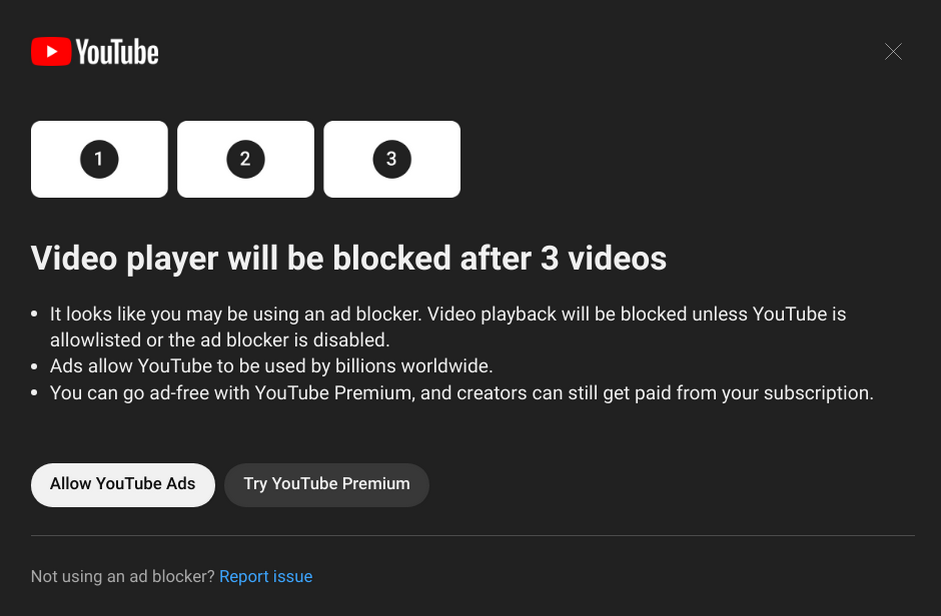YouTube is dead.
There, I said it. We’ve all been thinking it, maybe for years, but it’s finally happened. YouTube as we know it is gone.
After shambling along in a zombie state for far longer than I would have thought Google would allow, they have struck the biggest death blow they could have aside from just shutting the whole thing down outright.


That’s hardly a surprise though, is it? There’s a reason there are so many running jokes about Google killing off popular products. For the last few years it’s felt kind of like they want YouTube to fail. A conspicuous lack of moderation for the atrocious spam and hate speech in the comments section, massive shifts to “the algorithm” making it harder and harder for viewers to find the content we care about, other basic features not working well (or at all), an increasing number of upsells for “premium” plans, and of course, the ever-longer and ever-more-frequent ads.
For a company that specifically holds ad publishers to a high standard, Google has been serving more and more obnoxious ad formats on YouTube directly. Admittedly, the “Better Ads Standards” that Google promotes conveniently don’t address the exact scenarios that come up on YouTube. However, several of the types of ads it calls out do sound an awful lot like exactly what happens on YouTube: Auto-playing Video Ads with Sound is all but a description of the pre-roll ads before most YouTube videos (although that page does mention that they haven’t tested pre-roll or mid-roll video ads on video content relevant to the page, which seems like a pretty big omission). Under the Short-Form Video section, they call out all mid-roll ads as annoying and disruptive as well as long pre-roll ads that can’t be skipped, defining “long” as exactly 1 second longer than the durations of the ads and skip intervals on YouTube. Again… convenient.
There are a lot of very good reasons to block ads, which is why I will not be stopping. I’m even one of the many people who would be okay with non-intrusive advertising if it were an option. Typical ads, however, are anything but non-intrusive. At best (if you can call it that), they’re annoying and detract from the user experience. At worst, they have been documented to spread malware. In between, they reduce usable screen space available for actual content, reduce personal privacy through tracking and profiling, and often slow down your device and consume more power.
One of the reasons in particular this decision doesn’t sit well with me is that YouTube has historically been a free source of democratized entertainment. This is an abrupt end to that era, making YouTube effectively a paid-only streaming service. You can pay with your money, or you can pay with your time, patience, and security.
In my mind, YouTube is not a premium service. It’s where I (used to) go for free silly videos or a quick mini-documentary, not something I’m going to spend a lunch on each month for that exact same casual content. YouTube gave a lot away for a long time, and the decision to rescind that feels worse than if they had set that expectation to begin with. I think YouTube got too good at being a free service for its own good.
All of this isn’t to say that Google is wrong to try to monetize YouTube more. Video streaming is complex and expensive, and I understand why they’re doing what they’re doing. Especially with the recent sharp rise in the prevalence of ad blockers, companies like Google (and especially products like YouTube) that rely heavily on ad revenue are going to struggle more and more to be profitable or even viable.
That doesn’t mean I have to like how they’re going about it or agree with their tactics. Giving users an ultimatum like this has a strong chance of backfiring. There are three possibilities with ad blocking removed as an option:
- I relent and explicitly allow the deluge of annoying ads for things I already know I’ll never buy;
- I pay Google as much as I would for a “real” premium streaming service for the privilege of continuing how things were, but suddenly more expensively;
- I go elsewhere.
When I put it like that, the question for me isn’t which option to choose; it’s where to go for my entertainment now that YouTube is no longer a decent option. Having heard plenty of ad reads for Nebula from several of my favorite educational YouTubers, I’m thinking I’ll give that a try. It’s another paid-only service, but it’s owned and run by the creators making content for it, and it’s a lot more affordable than YouTube for what seems like it will be a much better experience.
Companies need to start looking at why users are blocking ads rather than just doubling down on strategies that clearly aren’t working. We live in an era of rapidly eroding choice and consent in many different areas right now, with YouTube ads probably being the least consequential thing in the history of things to gripe about. But hey, this is one place where it’s pretty easy for the proletariat to retake control. Even if there’s no directly equivalent alternative, the worst consequence for us choosing to go elsewhere is missing out on some specific exclusive content. I think I’ll survive.
It’s not us, Google. It’s you. Or at least your ads. But definitely also you.